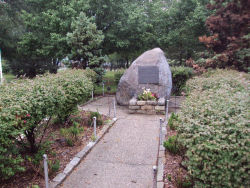Joseph Manna Park
Joseph Manna Park
This park is named for Seamen First Class Radioman Joseph Manna (1924-1942) who served and died on the United States Navy destroyer USS Duncan, during World War II. An immigrant from Licignano, Italy, a suburb of Naples, Manna came to the US with his mother Letizia and brothers Nick and Tony. After graduating from Port Richmond High School, Manna studied radio technology at City College but volunteered for the war at age 17.
During the Pacific Theater battle of Cape Esperance, on the night of October 11, 1942, the Duncan was part of a unit assigned to prevent the further landing of Japanese reinforcements on Guadalcanal. Manna’s ship torpedoed several Japanese vessels, but suffered heavy enemy shelling in the process. The Japanese guns focused on the ship’s bridge level, close to Manna’s battle station at the emergency radio outlet. The ship sunk later that evening. In 1944, Manna’s mother received a letter from the Navy at her Mariner’s Harbor home on Leyden Avenue, reporting that her son’s body had not been found. Manna’s nephew John and his brother Tony were present at the dedication of this park in 1992.
The monument that honors Joseph Manna is flanked by twin memorials to Navy men Frank Busso (1921-1942), who died at the Battle of Midway, and Constantine Busso (1919-1945), who lost his life during an attack on the USS Ticonderoga. On the northwest corner of the park, there are plaques honoring Staten Island residents Colonel Edward A. Bloom (1897-1918) and Private Harry A. Gill (1892-1918), who both served in World War I. Another plaque, on the eastern border of the park, honors the men and women of the Port of New York and New Jersey who served during World War II.
The City acquired this property, bounded by the Staten Island Expressway, Forest Avenue, and Goethals Road, in 1958. It fell under the jurisdiction of the Department of Transportation in 1971 for use in the building of the Staten Island Expressway, but once construction of the Expressway was completed, it was determined that the triangle was no longer needed. In 1991, the City assigned this land to Parks. It was named in honor of Manna by local law in 1992.
Parks, with the support of Councilman Jerome X. O'Donovan and the Mariner's Harbor Civic Association, turned the vacant piece of land into this small war memorial. In 1996, $64,575 from Mayor Giuliani provided for the renovation and reconstruction of the steel fence surrounding the park. The Mariner's Harbor Civic Association was instrumental in planting boxwoods, kale, summer poinsettias, and numerous evergreen pines on this quiet windswept triangle, that commemorates those who died for their country.
Check out your park's Vital Signs
Clean & Safe
Green & Resilient
Empowered & Engaged Users
Share your feedback or learn more about how this park is part of a
Vital Park System



